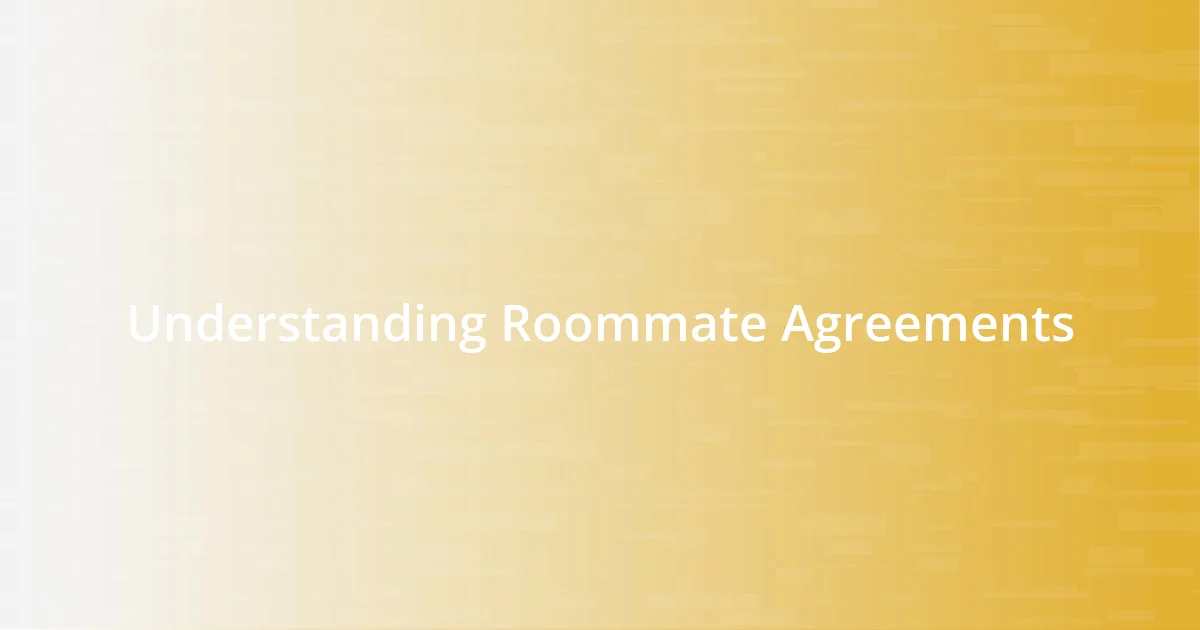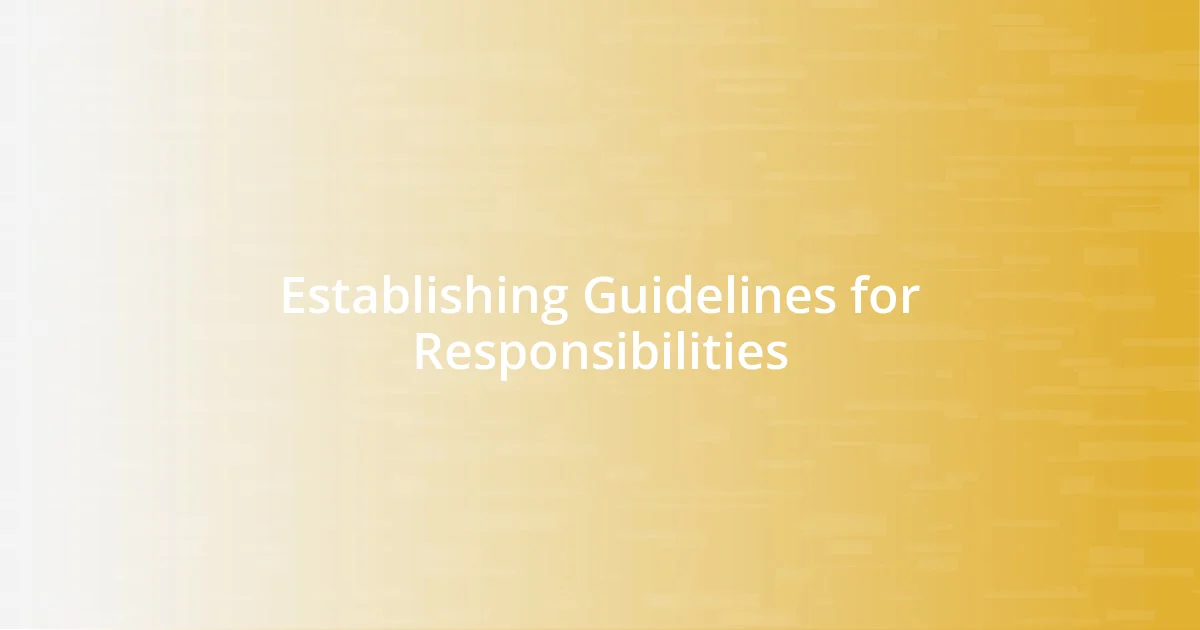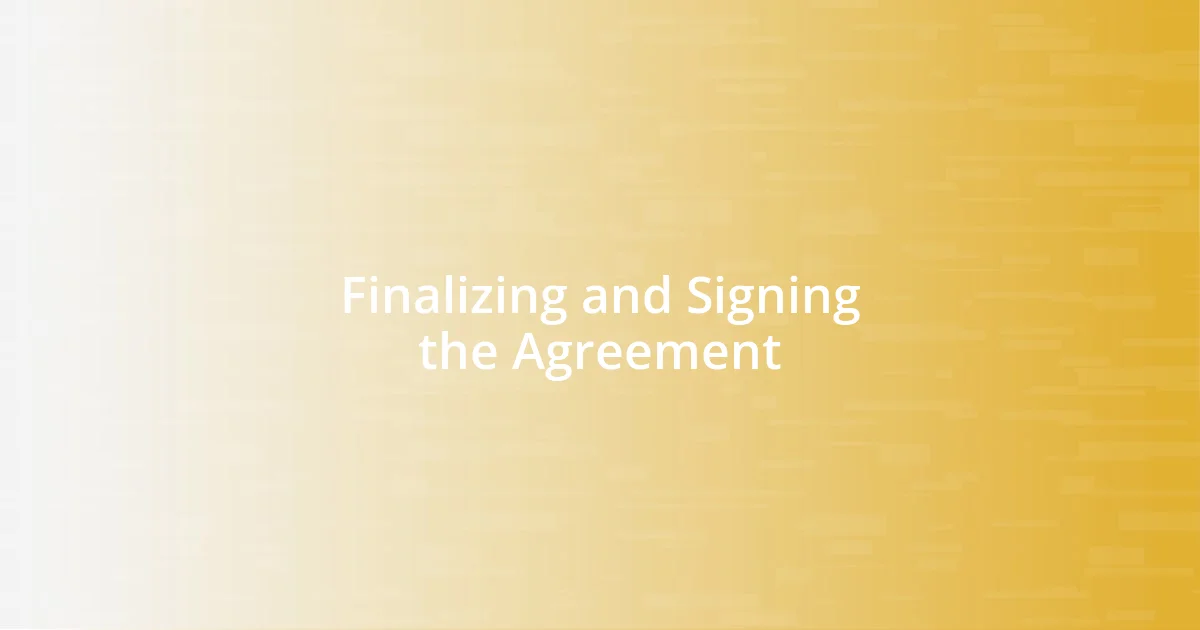Key takeaways:
- Establish clear communication and expectations in a roommate agreement to prevent misunderstandings and foster a positive living environment.
- Include key elements such as rent distribution, chores, personal vs shared spaces, and conflict resolution strategies in the agreement.
- Finalize and sign the agreement to create accountability, and keep a copy accessible for future reference and adjustments.

Understanding Roommate Agreements
Roommate agreements serve as a foundational tool for creating a harmonious living situation. They outline expectations and responsibilities, helping to prevent misunderstandings. I still remember when I first started living with a roommate; our agreement turned what could have been a chaotic situation into a smooth coexistence.
One of the most crucial parts of any roommate agreement is communication. Think about it: how often do we assume our roommate understands what we need or prefer? I learned the hard way that clear communication about bills, chores, and quiet hours is essential. When we formally laid out our expectations, it freed us from unspoken tensions and made our living space feel more like home.
While it can feel tedious to draft an agreement, the peace it brings is worth the effort. Just imagine living with someone who doesn’t respect your sleep schedule or insists on blasting music when you need to study. Establishing a mutual understanding can transform your shared space from a source of stress into one of support. In my experience, having that written agreement not only solidified our boundaries but also brought us closer as friends by fostering open dialogue.

Identifying Key Elements
When drafting a roommate agreement, it’s vital to include specific key elements such as rent distribution, household chores, and conflict resolution strategies. I recall a time when I shared a place with someone who had a very different approach to cleanliness. We quickly learned that specifying our chore schedule in the agreement helped alleviate disagreements before they could escalate.
Another important aspect is outlining shared and personal spaces. I still chuckle about the time I didn’t clarify fridge space usage, leading to an unexpected squabble over leftover pizza. By designating which sections were for my roommate and which were for me, we avoided unnecessary drama and maximized our fridge’s efficiency.
Finally, don’t overlook the significance of creating a plan for discussing potential issues. I always suggest setting a regular check-in to revisit the agreement and make necessary changes. It’s amazing how proactive communication can make your living environment much more enjoyable for both parties. With these key elements clearly identified, you’ll be setting a solid foundation for a successful roommate experience.
| Key Element | Description |
|---|---|
| Rent Distribution | Clarify how rent will be split and payment methods. |
| Chores | Develop a schedule that outlines who does what and when. |
| Conflict Resolution | Establish guidelines for addressing disputes as they arise. |
| Shared vs Personal Spaces | Define areas in the apartment that are communal and private. |
| Regular Check-ins | Set specific times to revisit the agreement and make adjustments. |

Setting Clear Expectations
Setting clear expectations is essential in any roommate agreement. I remember the early days of one of my past living situations, where assumptions ran rampant. We both thought we understood each other, yet small frustrations snowballed into bigger issues simply because we hadn’t communicated our needs clearly. I can’t stress enough how crucial it is to be open about things like chores, visitors, and noise levels from the get-go. It’s like putting on a fresh pair of glasses; everything becomes sharper and more defined.
When creating a roommate agreement, consider these key expectations:
- Communication: Discuss how and when you’ll communicate about issues that arise.
- Chores: Clearly outline who is responsible for what tasks and set a schedule.
- Visitors: Set guidelines on how often guests can come over and for how long.
- Shared Resources: Clarify how communal items (like kitchen supplies) will be used and replenished.
- Personal Time: Define quiet hours or downtime to respect each other’s space.
Being upfront isn’t just about avoiding conflict; it’s about creating a space where both of you can thrive. This approach can build trust and foster a mutual respect that makes living together a rewarding experience.

Establishing Guidelines for Responsibilities
Establishing guidelines for responsibilities can truly shape the dynamic between roommates. I once lived with a roommate whose schedule was drastically different from mine, and not discussing our typical waking and sleeping times led to some amusing yet frustrating moments—like me tiptoeing around at 7 AM while he attempted to catch some Z’s. It became clear that agreeing on our daily routines and responsibilities upfront was essential to avoid interruptions and foster a more harmonious living arrangement.
Developing a chores schedule was another insightful lesson. I recall how every Sunday, I would casually leave the dishes to pile up while my roommate preferred a spotless kitchen. This discrepancy in our cleanliness standards was a recipe for tension. By agreeing on a rotation system and taking turns for specific tasks, we turned what could have been a weekly argument into a simple and effective solution. Have you ever noticed how chores often become a hidden trap in shared living? It’s one of those areas where clarity pays off in the long run!
Moreover, defining the boundaries around shared responsibilities can lead to a more balanced relationship. I vividly remember when I first moved in with a roommate who assumed we’d split everything 50/50, from groceries to utilities. This left me feeling a bit overwhelmed, and I realized that transparency about who covers what and when makes a significant difference. I’ve seen how discussing these aspects openly not only prevents misunderstandings but also allows both parties to feel valued and responsible in the shared space. Have you thought about how much smoother living together could be with a bit of upfront communication?

Discussing Financial Obligations
When it comes to financial obligations, I learned the hard way that clarity is more than just niceties; it’s a must. When I roomed with a close friend, we assumed we’d easily manage sharing expenses, but it quickly became apparent that our budgeting styles clashed. I remember one month when my roommate forgot to pay their part of the electric bill. Instead of a simple reminder, it turned into an awkward conversation that left both of us feeling tense. It’s incredible how quickly finances can stretch the fabric of even the best friendships.
Setting clear guidelines about who pays what and when is crucial to avoid misunderstandings later on. For instance, I found it helpful to create a shared spreadsheet detailing all expenses, from rent to groceries. This transparency not only fostered accountability but also created a sense of teamwork. Seeing our combined expenses laid out helped us view our living situation as a partnership. Can you imagine how different our experience might have been if we’d approached this with openness from the beginning?
Another point I emphasize is to discuss how you’ll handle unexpected expenses. During one of my living arrangements, a surprise plumbing issue arose, and we were both caught off guard by the extra costs. I realized that having a small contingency fund saved us a lot of stress. By proactively talking about potential financial pitfalls, you can build a safety net that fosters trust. How great would it feel to know that both you and your roommate are financially prepared for life’s little surprises?

Addressing Conflict Resolution Strategies
When conflicts arise, having a strategy in place can make all the difference. I recall a time when my roommate and I disagreed about noise levels late at night. Instead of letting it fester, we created a simple yet effective rule: if either of us had guests over after 10 PM, we’d give each other a heads-up. This proactive communication not only eased the tension during those late-night gatherings, but also helped us maintain respect for each other’s peace.
It’s also beneficial to establish a structured approach for resolving issues when they pop up. One memorable experience I had involved differing opinions about sharing common items like food and kitchen utensils. We agreed that if either of us felt uncomfortable about something, we would sit down for a “roommate check-in.” This informal conversation allowed us to voice our concerns without fear of confrontation, leading to understanding and compromise. Have you ever considered how regular check-ins can transform the atmosphere in your home?
In some cases, written agreements can help clarify responses to conflicts. I remember drafting a document that specified how we would handle disagreements, such as taking a timeout before discussing heated topics. This tool allowed us to step back and approach problems with calmer heads, significantly improving our communication. Have you tried putting your conflict strategies into writing? It could be a game-changer in building a more harmonious living space.

Finalizing and Signing the Agreement
Once we had our agreement outlined, finalizing it felt like a significant milestone. I remember sitting down with my roommate, both of us a bit nervous but excited. We printed out our document and went through each section meticulously, double-checking our commitments. The moment we both signed it, I felt a wave of relief—like a weight had been lifted off our shoulders. It’s amazing how putting pen to paper can solidify intentions and make both parties feel more accountable.
Before you dive into signing, I highly recommend discussing every detail openly. I had an experience where a minor aspect of our agreement was overlooked during our review, and it led to confusion later on. I can’t stress enough the importance of ensuring both roommates fully understand their responsibilities. Think about it: would you feel comfortable trusting someone with a handshake? Probably not. In writing, there’s clarity, and that clarity can save you from potential misunderstandings.
Finally, don’t forget to keep a copy of the signed agreement. I made the mistake of losing track of it once, and it made referencing our established terms quite tricky. Having it stored somewhere accessible allows for quick reminders and discussions should any issues arise. Do you have a designated spot for important documents? Creating that organized space can really reduce future stress.















